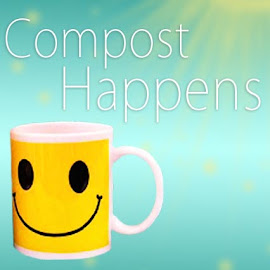Getting Greener, one monthly goal at a time
January: Read and learn. Join Paperbackswap.com for trading books. Don't stop buying books, but instead of hoarding them, pass them on to another reader through the swap network. I just finished The $64 Tomato (reviewed yesterday - just scroll down) and I'm reading Suddenly Frugal, a book with practical tips as green as they are frugal.
February: Switch to cloth napkins. This was so easy I wondered what took me so long to try it. I buy them on sale, so the investment is minimal. They go in with the rest of the wash, so there's no additional expense for laundry.
March: Dig a garden plot. If you live in the north country like I do, March might be too early. If your ground is still frozen, plant and nurture a few seeds. Herbs grow quickly; try basil and oregano.
April: Start backyard composting. Really. It's simple. Buy an inexpensive compost bin or build one yourself. There's no need for the fancy ones - unless you want something really cute like my new bin!
May: Plant a garden. Vegetables for eating, flowers for pleasure, but keep them local. No imports, please. Vegetables can be so satisfying. There's not much on Earth that can compare to a fresh tomato right off the vine.
June: Shop at a Farm Market or join a CSA. When you pass by the street musicians, drop some spare change in their cases. They offer so much enjoyment when they share their talents.
July: Use your own shopping bag. Keep a small one in your purse or the car's glove box. It's an easy routine to build if you keep the bags handy. As the habit grows, you'll collect fewer and fewer plastic bags. It's worth the (small) effort.
August: Before hitting the school supply sales, check your home. Buy only what you need. This is both economical and eco-conscious.
September: Use a reusable lunch box, including containers and flatware. Build this habit early, and the brown bag will never feel the same.
October: Rake your leaves into a pile over the garden or compost them. I said rake; the leafblower is overrated. Resist!
November: Cook local or regional specialties for Thanksgiving. That's easy for me to say: cranberries grow in my state! Seriously, however, localizing your food supply one step at a time is important. You don't need fresh pineapple if you live in Wisconsin. Cranberries will do.
December: Give up commercial wrapping paper. It's not recyclable, it's rarely reusable, it contains too many chemicals to be burned in a fireplace. Re-use gift bags or get creative with your wrapping. It'll save money while you save natural resources.
I saw the original inspiration for this post on Over Coffee: the Green Edition. She suggested twelve recommendations, one per month, for a person who wanted to become more eco-conscious but could only handle one change a month. Imitation being the most sincere form of flattery, I stole the idea. Here's my list: one action per month, meant to be additive so that after a year's time green behavior feels natural.
Previously posted here: updated today.
Labels: family life, garden, it's not easy being green
 Stumble It!
Stumble It!




3 Comments:
I think this is true of any change--getting more exercise, dieting, working more productively--little steps that stick before you change another thing! Great list--and I think I"m doing almost everything so far!
This is a fabulous list!
Your list is fantastic! This is a great idea. I'm a little brown around the edges...I want to be much greener. Shopping at a Farmers Market is one thing I'll start right away! Thanks, Daisy!
Post a Comment
<< Home